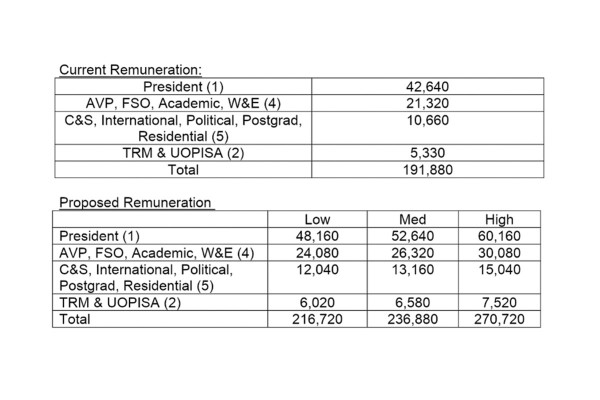An emergency meeting was held between the OUSA Exec last week to discuss the proposal of paying themselves more. Given they’re currently paid $20.50 per hour pre-tax (minimum wage in NZ is $23.15) you can see their reasoning. They plan to present proposed remuneration changes to the student body in an upcoming general meeting (date and time tbc).
As a bit of background, Exec remuneration undergoes a review every three years. With the last adjustment having been made in 2021, the time has come for another evaluation – especially given the state of the economy since then. Any increase in wages would reflect the ever increasing living costs students are all too familiar with.
In a memorandum regarding the proposal, Prez Keegan wrote: “The rationale is that this increase will reduce the financial pressure on Executive members, especially 10 and 20 hours, allowing them to focus solely on OUSA [and] their studies and not feel or have the need to work other part time jobs.” She argued that removing the need for other forms of income would result not only in better work-study-life balances, but better outcomes for OUSA as well.
Keegan called an “emergency” meeting – which just means a meeting at a time that isn’t their usual – upon realising that the usual time (Thursdays at 9am) would be too late to send their proposal in time for the OUSA budget deadline. It was a long meeting, with the Exec present holding a robust debate over proposed remuneration rates. No one can say they didn’t take it seriously.
The way that the Exec are paid can be a tad confusing, even to those currently in the role. Rather than being paid with a wage, as elected representatives they’re paid through an honorarium. Each quarter, in order to be paid their honorarium, each Exec member must submit a report basically proving that they’ve done the work they’re employed to do. Each report is made publicly available on the OUSA website (give them a read, they’re honestly entertaining).
The Exec vote on whether each member should be paid their honorarium each quarter. At the meeting for this year’s second quarter reports, following an intense discussion about the importance of holding each other accountable, it was decided that Residential Rep Stella’s honorarium be halved for the following month as she failed to provide four sections of her report – proving the Exec aren’t here to fuck around.
A sticking point during last week’s emergency meeting was where the money would come from to pay for any increases, since Exec honorariums are paid through commercial OUSA activities (like Beer Fest) and not the Service Levy Agreement (the money the Uni gives them) which pays for permanent OUSA staff wages.
Academic Rep Stella was strongly for an increase in pay for the Exec. She gave up a higher paying part-time job to take on her role, the duties of which she emphasised aren’t restricted to the 10 hours she’s paid for: “I’m on call 24/7.” Hanna’s advice for her was to simply not respond: “That’s what I do.”
During discussions, Keegan noted that income wasn’t the main attraction for taking on an Exec position, with other perks including valuable experience and networking opportunities – as well as free tickets to OUSA events (Hyde among them). Stella replied that, while that was true, in the balance between the duties of Exec and studies, the honorarium was most Exec members’ main form of income. The bottom line for her was that they shouldn’t have to choose between paying for groceries and petrol.
A perk to raising the pay for future Exec would include attracting talent fit for the responsibilities of each role (“not that there isn’t already!”). In terms of the President, they all agreed that students might be tempted to have “more scrutiny” for the position if they were being paid more. One thing everyone could agree on was that Te Rōpū Māori Tumuaki and UOPISA President – who are ex-officio roles on the Exec and paid five hours currently – should “definitely” be paid more.
Pols Rep Liam said it was important to him that they hold each other to account and communicate any changes well with students, saying they’d need to be ready for students to say, “You guys have just voted for more pay for yourselves.” In the spirit of holding each other accountable, and being completely transparent in what students’ money pays for in electing these scallywags as representatives, the Exec will be presenting the proposed increases in remuneration rates to the student body at a general meeting in the near future.
Out of low, medium and high options for changes in remuneration, the Exec decided on medium for part-time Exec positions, medium for the President (noting they’re also paid for their position on the Uni Council) and high for TRM and UOPISA positions. Proposed changes would take effect at the beginning of next year.



